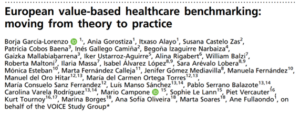The VOICE community, coordinated by Biosistemak, publishes the methodological approach to carry out a benchmarking of patient-centred measures, which subsequently allows the exchange of good practices between health centres.
 Value-Based Healthcare (VBHC) is a conceptual framework for improving the value of healthcare based on patient health outcomes and the use of resources employed, by putting the patient first and asking the patient about their perception of their health and the healthcare received. Benchmarking among healthcare providers should provide useful information to identify best practices and, therefore, be an instrument to improve the quality of care in healthcare organizations. This article, led by researchers from the Biosistemak Value-Based Healthcare Research Group, aims to provide a proof of concept of the feasibility of international benchmarking from the perspective of the ASBV in breast cancer, with the subsequent objective of being used to share best practices among healthcare organizations.
Value-Based Healthcare (VBHC) is a conceptual framework for improving the value of healthcare based on patient health outcomes and the use of resources employed, by putting the patient first and asking the patient about their perception of their health and the healthcare received. Benchmarking among healthcare providers should provide useful information to identify best practices and, therefore, be an instrument to improve the quality of care in healthcare organizations. This article, led by researchers from the Biosistemak Value-Based Healthcare Research Group, aims to provide a proof of concept of the feasibility of international benchmarking from the perspective of the ASBV in breast cancer, with the subsequent objective of being used to share best practices among healthcare organizations.
The work, developed in the VOICE community, collected information on Patient-Reported Outomes (PRO), Clinical-Related Outomes (Clinical-Related Outomes), Care-Process Outcomes (CAPRO), and Economic-Related Outcomes (ERO). Patient archetypes were identified using clustering techniques and a set of indicators was defined following a modified Delphi. Benchmarking was performed using regression models controlling for patient archetypes and other socio-demographic characteristics.
The sample included 690 patients diagnosed with breast cancer from six health centers spread across three health systems at the European level. A set of 50 health, process, and economic indicators were extracted for benchmarking. Statistically significant differences between health centers were found in most health outcomes, half of the process indicators, and in all economic indicators, allowing the best and worst centers to be identified on an indicator-by-indicator basis.
It is worth noting that this study is the first international experience providing evidence for benchmarking in VBHC. The differences in indicators between health centers can be a useful tool to identify best practices and improve the quality of health care in order to offer better care to breast cancer patients. The methods applied are scalable to other medical conditions.
Click on the following link to read the full article and learn more about the work led by the Biosistemak team: https://academic.oup.com/eurpub/advance-article/doi/10.1093/eurpub/ckad181/7329157





